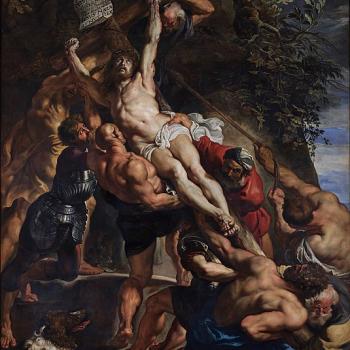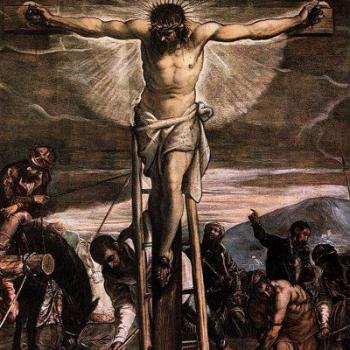Last Sunday one of our Scripture readings was about the children of Israel complaining in the wilderness, whereupon they were attacked by fiery serpents until Moses healed them by lifting up a bronze serpent on a pole, which Jesus would later apply to Himself (Numbers 21:4-9; John 3:14-21).
I was struck by one of the Israelite’s whines: “We loathe this worthless food” (Numbers 21:5). They were talking about Manna! The miraculous food that God supplied them day by day without their effort! It was delicious! “It was like coriander seed, white, and the taste of it was like wafers made with honey” (Exodus 16: 31). And yet, even though this was an astounding miracle from a loving God, the people got tired of it. They thought it was boring. It became something to complain about. “We loathe this worthless food.”
How often we–or, I should say, I–take our blessings for granted, to the point of thinking them worthless. The only remedy, I suppose, is for fiery serpents to awake us to our need. And for the Bronze Serpent to show us how that very sinfulness has been crucified and for the one who bore that sin in His body to heal us.
Our pastor didn’t take exactly that angle on the text, but you should see how he preached it. From Rev. James Douthwaite, St. Athanasius Lutheran Church: Lent 4 Sermon:
Well today, look how seemingly mean God is! We heard that He sent fiery serpents to attack His people in the wilderness and bite them. Well, many don’t like that. It doesn’t sound very nice. A loving God wouldn’t do that. God’s a meanie.
But here’s the thing and here’s the truth that God knew: His people had already been bitten, and by a serpent far more deadly than the ones He sent. For they had not just turned away from God but against God. They told Moses: God’s not good. You and Him, you just brought us up out of Egypt to be even more mean to us than the Egyptians were, and to die in this wilderness. There’s no food and no water and, oh yeah, this so-called food, this manna, you say God is giving us? We hate it.
Now, it hadn’t been too long before this that God had sent the plagues upon the Egyptians, including the Passover. He got the Egyptians to release them from their slavery and even give them gold and silver on their way out. He led them through the Red Sea and closed it back up on the pursuing Pharaoh and his army. He gave them the manna to eat and water from a rock to drink. Whatever they needed, God provided for them. So how could they turn against such a God? Because they got bit. And that’s also the only reason they were still in the wilderness, because they got bit and wouldn’t believe God and go into the land He led them to, that He had promised to give them. They got bit, and it was killing them. Turning them against the God that gave them – and was still giving them – life.
They got bit by the same serpent that bit Adam and Eve in the Garden and did the same thing to them. Look at all that God had given them! A perfect and wonderful place to live, all the food you could ever want, peace and harmony with all of creation, and a perfect spouse, specially created just for them. So how could they turn against such a God? Because they got bit. And it killed them. It turned them against the God that gave them – and was still giving them – life. . . .
And so in the wilderness He sent fiery serpents. Mean? No, merciful. His people were dying and He needed them to realize what they were doing and to turn back to Him in repentance and faith. Hard? You bet. But would anything less have turned His people back to Him? And when they did, God provided a cure, a way out, by faith. He didn’t just wave His hand and make all the serpents go away. He didn’t just speak and make everyone better again. He could have. But instead He told Moses to make a serpent and put it on a pole. And Moses did so. And then He attached His Word and promise to that serpent – that if a serpent bit anyone . . . look at the bronze serpent and live. They would live by faith in that promise of God.
That’s what God had done with Adam and Eve as well. After they sinned and rebelled against Him He expelled them from the Garden and from that point on life was going to be most difficult for them. Mean? No, merciful. Because at the same time He gave them a Word and promise attached to the physical reality of child-bearing. That one day, one of the children born from Eve, descended from her, would defeat that serpent that bit them and crush his head. And from that day on, they would live by faith in that promise of God.
And then God did it. He fulfilled His promise. We heard it today from John – that just like it was in the time of Moses, when the people got bit and Moses lifted up that serpent in the wilderness, God sent His Son to be that for us. God sent His Son, descended from Eve, so that we and all who are bit and dying look at Him up on that pole of the cross, and live. Looking not just with physical eyes, but with the eyes of faith, believing the Word and promise of God that because of Jesus we will live and not die. For, Jesus said, His Father didn’t send Him to condemn them world – we were already that. We were already dying. We were already bit. The default is not that if God would just back off a bit I’d be alright or we’d be better off. The default is if God does nothing, if God doesn’t act, then the world is a lot worse place than it already is; than sin has made it. And we’re hopeless, lost, dead men walking. So no, He didn’t come to condemn the world; He came that we may live. That the world might be saved through Him; through the anti-venin of the forgiveness of our sins.
[Keep reading. . .]
















